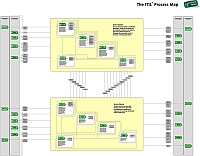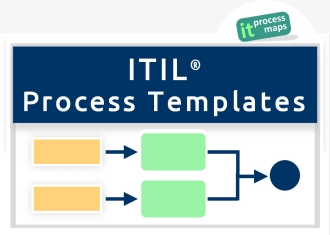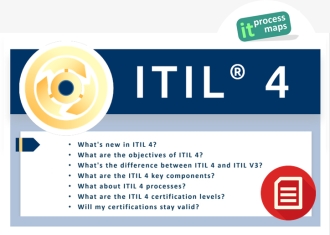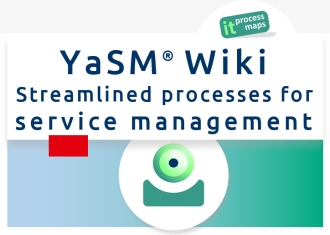ITIL Processes: Difference between revisions
No edit summary |
mNo edit summary |
||
| Line 1: | Line 1: | ||
<seo metakeywords="itil processes, itil process, itil v3 processes, itil v2 processes, itil stages" metadescription=" | <seo metakeywords="itil processes, itil process, itil v3 processes, itil v2 processes, itil stages" metadescription="ITIL processes according to ITIL 2011. ITIL process definitions: Service Strategy, Service Design, Service Transition, Service Operation, CSI." /> | ||
<imagemap> | <imagemap> | ||
Image:ITIL-Wiki-de-es.jpg|DE - ES - ITIL Processes - Processes ITIL V3|100px | Image:ITIL-Wiki-de-es.jpg|DE - ES - ITIL Processes - Processes ITIL V3|100px | ||
| Line 8: | Line 8: | ||
<br style="clear:both;"/> | <br style="clear:both;"/> | ||
== <span id="ITIL V3 Processes">ITIL Processes according to | == <span id="ITIL V3 Processes">ITIL Processes according to ITIL 2011</span> == | ||
The ''ITIL processes'' within IT Service Management ensure that IT Services are provided in a focused, client-friendly and cost-optimized manner. With their help, IT Services are clearly defined, success can be measured with regards to the service provision, and targeted improvement measures can be introduced where necessary. | The ''ITIL processes'' within IT Service Management ensure that IT Services are provided in a focused, client-friendly and cost-optimized manner. With their help, IT Services are clearly defined, success can be measured with regards to the service provision, and targeted improvement measures can be introduced where necessary. | ||
In ITIL 2011 the ITIL processes are grouped into five stages: ''follow the links to get to the pages with detailed ITIL | In ITIL 2011 (ITIL V3 2011 Edition) the ITIL processes are grouped into five stages (see [[:File:itil-processes.jpg|Fig. "ITIL Processes"]]): ''follow the links to get to the pages with detailed descriptions of the ITIL processes''. | ||
<p> </p> | <p> </p> | ||
| Line 48: | Line 48: | ||
<br style="clear:both;"/> | <br style="clear:both;"/> | ||
<html><a rel="author" href="https://plus.google.com/111925560448291102517"><img style="margin:0px 0px 0px 0px;" src="/skins/Vector/images/itpm/bookmarking/gplus.png" width="16" height="16" title="By: Stefan Kempter | Profile on Google+" alt="Author: Stefan Kempter, IT Process Maps GbR" /></a></html> | |||
<!-- This page is assigned to the following categories: --> | <!-- This page is assigned to the following categories: --> | ||
[[Category:ITIL stage|!]][[Category:ITIL discipline|!]][[Category:ITIL process|!]] | [[Category:ITIL stage|!]][[Category:ITIL discipline|!]][[Category:ITIL process|!]] | ||
<!-- --- --> | <!-- --- --> | ||
Revision as of 12:06, 14 June 2013
<seo metakeywords="itil processes, itil process, itil v3 processes, itil v2 processes, itil stages" metadescription="ITIL processes according to ITIL 2011. ITIL process definitions: Service Strategy, Service Design, Service Transition, Service Operation, CSI." />

ITIL Processes according to ITIL 2011
The ITIL processes within IT Service Management ensure that IT Services are provided in a focused, client-friendly and cost-optimized manner. With their help, IT Services are clearly defined, success can be measured with regards to the service provision, and targeted improvement measures can be introduced where necessary.
In ITIL 2011 (ITIL V3 2011 Edition) the ITIL processes are grouped into five stages (see Fig. "ITIL Processes"): follow the links to get to the pages with detailed descriptions of the ITIL processes.

ITIL Processes: Service Strategy
Process Objective: To decide on a strategy to serve customers. Starting from an assessment of customer needs and the market place, the Service Strategy process determines which services the IT organization is to offer and what capabilities need to be developed. Its ultimate goal is to make the IT organization think and act in a strategic manner.
ITIL Processes: Service Design
Process Objective: To design new IT services. Its scope includes the design of new services, as well as changes and improvements to existing ones.
ITIL Processes: Service Transition
Process Objective: To build and deploy IT services. This process also makes sure that changes to services and Service Management processes are carried out in a coordinated way.
ITIL Processes: Service Operation
Process Objective: To make sure that IT services are delivered effectively and efficiently. This includes fulfilling user requests, resolving service failures, fixing problems, as well as carrying out routine operational tasks.
ITIL Processes: Continual Service Improvement (CSI)
Process Objective: To use methods from quality management in order to learn from past successes and failures. The Continual Service Improvement process aims to continually improve the effectiveness and efficiency of IT processes and services, in line with the concept of continual improvement adopted in ISO 20000.
ITIL Processes according to ITIL Version 2 (ITIL V2)

IT Service Management according to ITIL V2 encompasses the following processes (follow the links to get to the pages with detailed descriptions):
ITIL Processes: Service Support
The ITIL discipline Service Support provides all operative Processes necessary for the handling of Service interruptions and for the implementation of Changes; the availability of the IT Services is thereby guaranteed.
ITIL Processes: Service Delivery
The ITIL discipline Service Delivery ensures that binding rules for the operative Processes are in existence. It regulates the planning, contractual and financial topics.






